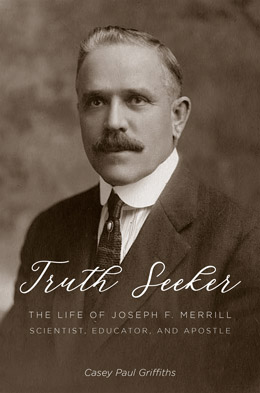Acknowledgments
Fifteen years ago, I had no idea who Joseph F. Merrill was. I was a master’s student at Brigham Young University and was planning on writing my thesis on Latter-day Saint apocalypticism in the Civil War. At a lunch with Scott Esplin, he informed me that no one had ever written anything about Joseph F. Merrill and that his papers were kept at BYU, completely open and available to the public. An hour later I was in Special Collections looking through Elder Merrill’s papers. It was the beginning of a long journey, and Scott was the person who first pointed me down this path. From the very inception of this project as a master’s thesis to this publication, Scott has been a great support and a wise friend. Soon after, Mary Jane Woodger joined in as a member of my committee and has been a great support and help to me ever since. Finally, Alan K. Parrish chaired my committee, and no graduate student has had a more kind and encouraging mentor. Richard D. Draper and Clyde Williams also provided great leadership to our master’s program. Additionally, Richard E. Bennett and Richard O. Cowan taught a wonderful class in Church history that encouraged me to move forward in this effort.
As the project progressed and grew, many of my colleagues in Religious Education offered their support and help. While I was a seminary teacher, several principals, including Randy Osbourne, Randy Folger, Scott Fitch, Perry Montoya, Darren Palmer, and Andy Horton, allowed me time from work to support my research. Among the leadership of Seminaries and Institutes, Robert Ewer, Paul V. Johnson, Chad Webb, Thomas Valetta, Randall L. Hall, and many others gave me support and allowed me to work on this project as part of my work on By Study and Also by Faith (2015), a history of the seminary and institute programs. Vance Randall, from the Educational Leadership and Foundations Department at Brigham Young University, was a great mentor and taught me much as I worked as his research assistant.
As the project progressed, I began spending a lot of time at the Church History Library, where a number of people provided invaluable assistance to my research. Among the wonderful staff there, no one was more helpful than Brittany Chapman Nash. William W. Slaughter also opened doors for me in a way no one else could, and I cannot say enough good about the rest of the staff at that institution. I am also deeply indebted to the people who provided assistance and a number of different repositories, including the L. Tom Perry Special Collections at Brigham Young University, the Marriott Library Special Collections at the University of Utah, the Merrill-Cazier Library at Utah State University, and the Utah State Historical Society.
Along the way, I have also been fortunate to meet with several Merrill family members who provided help with documents, family records, and photographs. Hyde M. Merrill, Annie Whitton, Taylor S. Merrill, and Scott Merrill helped me in ways no one else could have.
As I moved from Seminaries and Institutes to serve as a full-time faculty member at BYU, the project continued with encouragement from great mentors like Craig K. Manscill, Craig J. Ostler, Kenneth L. Alford, Brent L. Top, J. B. Haws, Keith J. Wilson, Anthony Sweat, Alexander L. Baugh, and Daniel K Judd. I could include nearly the entire faculty in Religious Education, who have all been supportive and kind throughout this process. It is wonderful to work with such generous and caring colleagues.
The staff at the Religious Studies Center, including wonderful students such as Cara Nickels, are always a pleasure to work with. My first publication several years ago was crafted by them, and I was relieved that they would be part of the team to produce this biography. The staff, including Joany Pinegar and Brent Nordgren, are professional and skilled. Devan Jensen, a Merrill relative, is a delight to work with and one of the most enthusiastic and pleasant people around. I am so glad this story found a home with them.
I must also acknowledge a supportive and wonderful family that always believed in me. My parents, Keith and Laurie Griffiths, have attended every presentation, symposium, and class they were allowed into. My wife, Elizabeth, and our children, Acacia, Joshua, Emmeline, and Grace, have been patient during the long hours of writing and research. It is such a joy to live in a happy home.
Finally, though he passed several decades before my birth, I must acknowledge the mentorship of Joseph F. Merrill himself. This project has been a consistent thread through all of my graduate education and my academic career. In a world with so much hypocrisy and cynicism, it was an honor to read the public and private thoughts of a person of real character. He was not perfect by any means, and I have tried to portray him as a real person with struggles and difficulties. But he was also a true man, a man who lived his principles, and held fast to his beliefs. Finding someone with such integrity is a rare and wonderful blessing.
